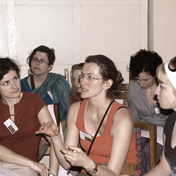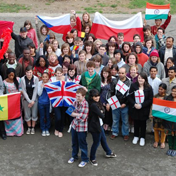Safe schools for Kenya
The project “Safe schools for Kenya – improvement of sanitary conditions and children’s health in public schools of rural areas of Central and Nyaza regions” is aimed at creating school environment which will lead to a lasting improvement of health, sanitary conditions and safety of children and teachers at ten primary schools in Koderobara village in Nyaza region and in Ririoni, Makutano, Manguo, Kamirithu, Mabroukle and Roroni villages in Central region.
The project focuses on satisfying most basic and urgent sanitary and health related needs of 7800 children and their 150 teachers at 10 primary schools in rural areas. As the infrastructure part of the project it is planned that 60 toilets and 50 water taps will be installed at schools that have no or limited access to clean water and existing toilets constitute a life (collapsing foundations, threaten with the complete destruction of the building) or health (overflowing latrines lead to direct users’ contact with fecal matter) hazard.
Along with the improvement of sanitary infrastructure we are going to offer institutional support to education institutions – committees on health issues are going to be established at ten schools with the goal of improving sanitary conditions (implement the system of daily toilet upkeep, providing soap and toilet paper) and running education campaigns among both students and teachers about proper use of new sanitary facilities, health and hygiene issues that ideally should lead to behavior changes. Students of the 10 schools will be invited to participate in eco-clubs that are going to help create school environment conducive of both health and learning. As a part of the project devoted to developing schools’ competencies in the area of sanitary safety, they are going to initiate activities aiming at improvement of health and sanitary safety at their respective areas and in neighboring villages. Health committees and students eco-clubs are going to run educational campaigns aimed at about two thousand people – their parents and other member of their local communities.
The project is realized in cooperation with the Kenyan organization Education Effect Africa and is co-financed by the Polish development cooperation program of the Ministry of Foreign Affairs for the year 2014.










